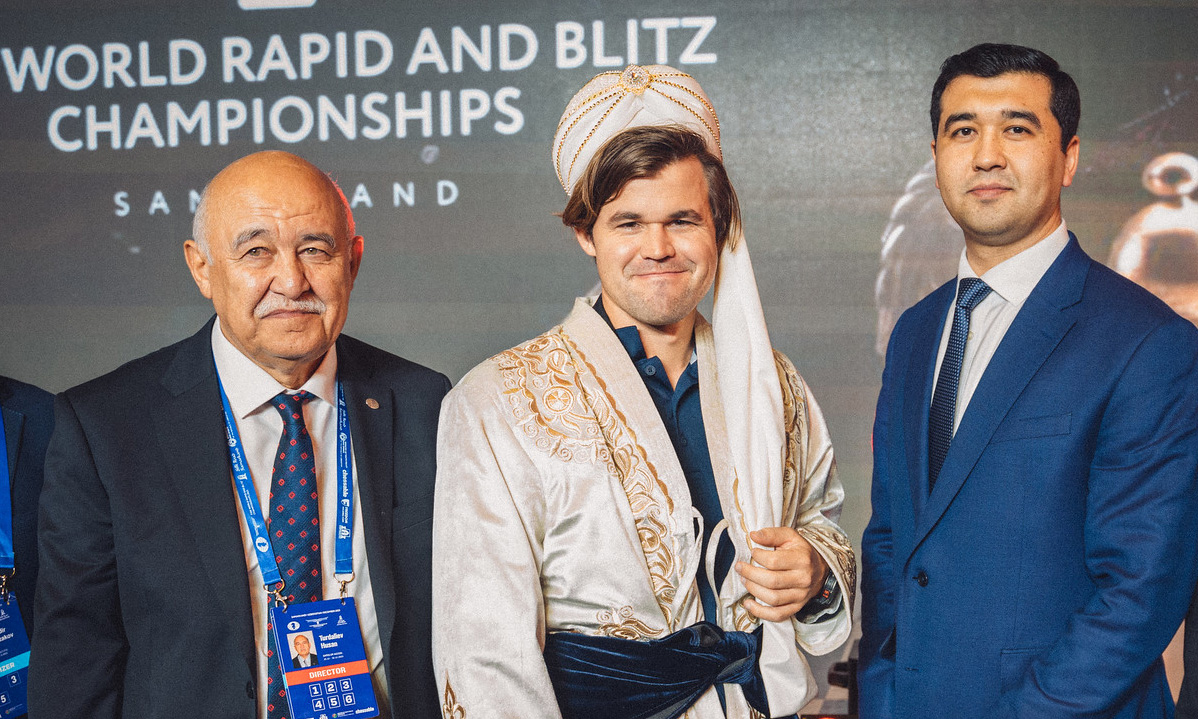The ongoing World Rapid and Blitz Championship in Samarkand, Uzbekistan, has seen its fair share of controversies, particularly surrounding the treatment of reigning champion Magnus Carlsen. Russian grandmaster Ian Nepomniachtchi recently stirred the chess community by addressing what he perceives as special treatment for Carlsen.
The point of disagreement arises from Carlsen allegedly being provided with a personal lounge equipped with a laptop, affording him a private space to rest and strategize between matches. Nepomniachtchi took to social media, questioning the fairness of this setup: “Is it fair to give Carlsen a personal room where he can rest and prepare for the match using a laptop, where no one else has such an opportunity?”
Nepomniachtchi’s vocal criticism has sparked a debate on whether such special treatment accorded to a specific player undermines the level playing field essential in competitive chess. Interestingly, this isn’t the first time Carlsen’s accommodations have come under scrutiny during this championship.
Support for Nepomniachtchi’s stance has come from various quarters, including chess figures like Fabiano Caruana or Maxime Vachier-Lagrave, who emphasized the importance of equality in tournament conditions. However, there are contrasting opinions from different players, with some suggesting that similar privileges might have been extended to others in past editions, including Nepomniachtchi himself and Hikaru Nakamura.
Nakamura, who had a private room in a previous year but clarified that access was granted near the tournament’s end, seems to lend support to the fact that such facilities might not be as exclusive to Magnus Carlsen as suggested. Additionally, there were certain players, including Nepomniachtchi, had access to lounges in previous tournaments.
The debate isn’t solely about the physical accommodations but also addresses whether the use of a laptop between matches violates the rules governing fair play. There have been mentions of regulations in other championships that prohibited laptop usage between tiebreak rounds, raising concerns about potential violations.
However, Henrik Carlsen, Magnus’ father, refuted claims of his son using a laptop between matches, asserting that Magnus doesn’t have access to one during breaks. “Magnus does not have access to a laptop between games”, he said via Norwegian TV2.
The uproar surrounding Carlsen’s alleged advantages underscores the larger issue of ensuring parity and fairness in competitive chess tournaments. FIDE, the governing body, has yet to issue an official statement or response regarding Nepomniachtchi’s appeal.
As the World Rapid Championship hurtles toward its conclusion on December 28, and the Blitz Championship looms on December 29-30, the ongoing debate over player advantages continues to add intrigue to an already intense competition.
The saga serves as a reminder of the nuanced discussions surrounding equality and fairness in competitive sports, particularly in a game as strategic as chess. The outcome remains uncertain, but the debate ignited by Nepomniachtchi’s appeal reverberates across the global chess community, calling for a reevaluation of the standards of fairness and equality in top-tier tournaments.
The 2023 FIDE World Rapid and Blitz Chess Championship takes place from December 26 to 30 in Samarkand, Uzbekistan, a city renowned for its historical significance as the discovery site of the world’s oldest chess pieces dating back to the 6th to 8th century AD. Over 350 players hailing from 50 federations will gather here to vie for the prestigious titles of world champion in both rapid and blitz chess categories.
The FIDE World Rapid Chess Championship 2023 is scheduled from December 26 to 28 and will follow a 13-round Swiss system format in the Open event, while the Women’s section will feature an 11-round Swiss system.

I’m a passionate board game enthusiast and a skilled player in chess, xiangqi and Go. Words for Attacking Chess since 2023.

